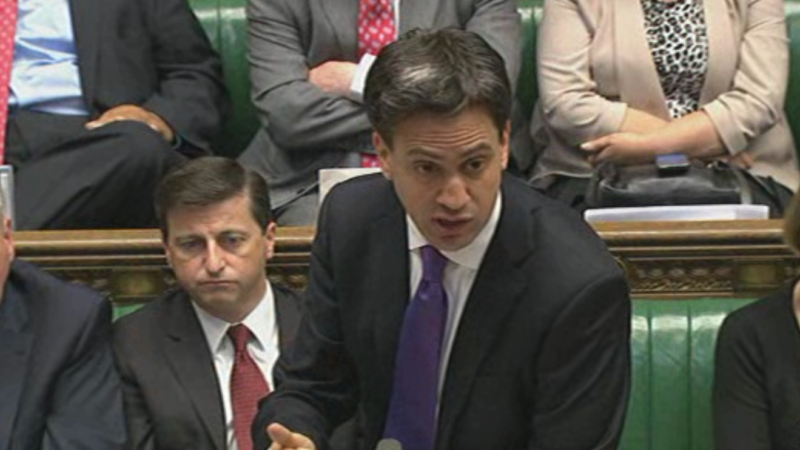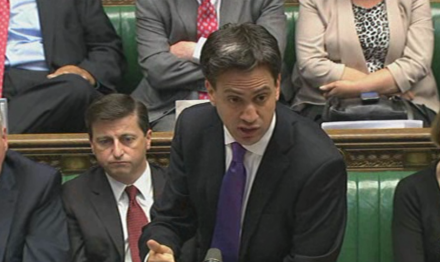

Mr Speaker, I rise to support the government motion concerning military action against ISIL in Iraq.
It is right that the Prime Minister has brought this issue to the House and that he has committed that he will bring any future decisions to this House too.
And all of us whatever side of this debate we are on will be conducting it with huge admiration for the bravery, spirit, and the duty displayed by our armed forces, who act on the decisions this House makes.
Let us be clear at the outset what is the proposition: air strikes against ISIL in Iraq.
Not about ground troops.
Nor about UK military action elsewhere.
And it is a mission specifically aimed at ISIL.
As we debate this issue today, I understand the qualms and for some deep unease that there will be about this undertaking both in this House and in the country.
Those who advocate military action today have to persuade members of this House and the country not only that ISIL is an evil organisation but that it is we, Britain, who should take military action in Iraq.
I want to do so by setting out the particular nature of the ISIL threat, the criteria we should apply to judging the case for military action, and also the role of our country in the world which is directly relevant to this decision.
It is important, as the Prime Minister said, that we understand that ISIL is not simply another terrorist organisation.
We have seen it’s hostage-taking of innocent British citizens.
And it is not just British citizens who they are threatening: Christians, Yezidis, fellow Muslims, Sunni and Shia, from many different countries and backgrounds.
Anyone who does not subscribe to their deeply perverted ideology.
Just one hideous example was recently gathered by Amnesty International.
On the morning of Friday the 15 August, ISIL fighters assembled the residents of Kocho village in Northern Iraq at the secondary school, where they separated men and boys from women and younger children.
The men were then driven away to different nearby locations, where they were shot.
The women and children of the village were abducted and continue to be held by ISIL.
Let’s be clear about what this is: ISIL is murdering Muslims.
So to those who say that military action against ISIL is somehow an attack on Islam:
I understand the anxiety.
But the truth is entirely different.
And it is Muslims themselves who are saying this.
And leading British Muslim scholars and Imams wrote recently: “they are perpetrating the worst crimes against humanity … It is a war against all humanity.”
ISIL’s ideology has nothing to do with the peaceful religion practised by people across the world and by millions of our fellow citizens, who are appalled by what we see.
And it is not simply that ISIL is a murderous organisation, it has ambitions for a state of its own – a Caliphate across the Middle East, run according to their horrific norms and values.
So we cannot stand by against the threat of ISIL.
But in acting against them we need to learn the lessons from the past.
That means a comprehensive strategy, humanitarian and political as well as military, rooted in the region.
Some of this is underway. More needs to be done.
But to make this alliance work there is need for military action to contain and help counter the threat of ISIL in Iraq.
That is why we are meeting today.
To make the case, I want to return to the criteria I have previously set, criteria which learn from the past.
First, in any action we take there is a need for just cause.
I believe ISIL does establish this case.
On humanitarian grounds, that I have set out.
On grounds of national interest, the international instability that would be created by the overthrow of the democratic Iraqi state would clearly have implications for the stability of the region.
And make it more likely that Iraq would become a haven and training ground for terrorism directed at the UK.
Second, military action must always be a last resort.
Again I believe this criterion is met.
ISIL have shown that they are not an organisation that could or should be negotiated with.
Third, there must be a clear legal base to provide legitimacy and legal force to our actions.
We support this motion today because we would be responding to the request of a democratic state in Iraq fighting for its own survival.
This is recognised in the UN Charter.
Therefore, I believe the legal case is clear.
Fourth, we must believe there is a reasonable prospect of success before we take the grave step of committing our forces.
This is the hardest test.
But the aim is clear.
It is to reinforce the democratic government of Iraq, prevent the advance and help roll back ISIL at the invitation of that democratic government.
And it is to do that by using international military air power while the Iraqi army and the Kurdish Peshmerga conduct a ground campaign against ISIL.
Nobody should be in any doubt that this is a difficult mission and it will take time.
But there is already evidence that the US action is having the effect of holding back ISIL.
And prior to this action, ISIL was advancing with catastrophic consequences for the Iraqi people.
As in June, when ISIL took Mosul.
Failure to act would mean more Mosuls and more killing of the sort I described earlier.
Fifth, there must be broad support in the region for reasons of legitimacy, because this action must not be seen as a new form of imperialism.
And effectiveness, because regional support is essential to the long term success of the mission.
At the end of August, the Arab League made a statement calling for comprehensive measures to combat ISIL.
And we now see a regional coalition of Jordan, the United Arab Emirates, Bahrain and Saudi Arabia and Qatar.
As well as other countries.
Sixth, the proposed action must be proportionate.
We must make sure that innocent civilians are protected.
And I know there are strict conditions in place to ensure proper targeting and to do everything possible to avoid civilian casualties.
So having scrutinised these six conditions – just cause, last resort, legal base, reasonable prospects, regional support, proportionality – I believe they are met.
Some people might accept these criteria but say it is not our job to intervene because western intervention always makes things worse.
I understand this argument but I do not agree.
Intervention always has risks but a dismembered Iraq would be more dangerous for Britain.
ISIL unchecked means more persecution of the innocent.
If we say to people that we will pass on by, it surely makes it far harder to persuade Arab countries to play their part.
And, finally, we should pride ourselves on our traditions of internationalism.
But, of course, I understand the reason for wariness and I share it.
And I want directly to address an overriding reason for this wariness: the 2003 war in Iraq.
I was not in the House in 2003, but I was not in favour of that war.
I understand why some who were will wonder if this is a repeat of that experience.
In my view, it is not.
This case is about supporting a democratic state.
Not overturning an existing regime, and seeking to build a new one from the rubble.
There is no debate about the legal base for action in Iraq, as there was in 2003.
There is no argument about whether military action is a last resort.
There is broad international support not a divided world, with all 28 EU member states and the Arab League providing support.
And five Arab states taking part in action.
There is no question of British ground troops being deployed.
So the case against cannot simply be that this is a rerun of 2003.
The late Robin Cook said in his resignation speech on the eve of the Iraq war:
“Our interests are best protected not by unilateral action but by multilateral agreement and a world order governed by rules.”
This is multilateral action prompted by a legitimate, democratic state.
And a world order governed by rules if it is about anything must be about protecting a democracy.
Which is what this motion is about.
I believe although this is difficult, this is the right thing to do.
There is no graver decision for our Parliament and our country.
But protecting our national interest, security and the values for which we stand is why I will be supporting the motion this afternoon.




More from LabourList
‘The hope that kills you’: Reflections from the final day in Gorton and Denton
MPs, union leaders and organisations react to ‘bruising’ Gorton and Denton result
A gory night for Labour